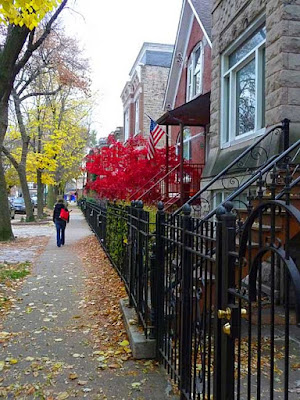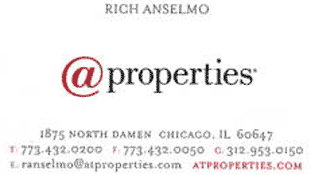What's at risk: Measuring change, neighbor by neighbor

Neal McKnight is not voting as an East Village Association board member on a restaurant proposed at the end of his block. But he has been participating in the discussion, and here he offers a personal view about why it's an important debate.
By Neal McKnight
My wife and I have two daughters and we live on Winchester Avenue in East Village. Mom lives across the street and some of my best friends in the world are my neighbors.
We have lived here since 1995, longer than some and much shorter than others. Over the years we have seen waves of development roll through the neighborhood, some of it good and some of it bad. The recession has slowed development in the neighborhood in the last couple of years, but recently new developments have been proposed along Chicago Avenue.
The latest proposal is for a 250-seat bar-restaurant at the northeast corner of Chicago and Winchester avenues. I think the hours and size of this business will alter the character of my street and ultimately our neighborhood. The block, the neighborhood, the city I know and love is at risk.
Each time a bar (and let's face it, it really is mainly a bar) forces someone to leave because it is too loud, because there is nowhere to park, because the patrons have forced the neighbors inside, off the sidewalk, off the porches, or to shut their windows, my street becomes a smaller, narrower place.
This undermines the stability of our neighborhood. I don’t know if anyone will leave if this place opens, but I do know if this place opens it will be a different, less attractive block.
Division Street is great but it does not make the city great. I don’t want Division Street on my street. Good development does not mean building a playground only for transient and newly employed recent college graduates.
Too often we just look at the size of building, the type of business, the number of customers. We focus on zoning changes, licenses and permits in an attempt to keep new businesses from damaging our community. But there is more at stake than property values and business interests.
It is important to remember the stability of our community and value what we already have before we allow any business to change the character of our community. After all, that is why business wants to be here.
I love my street. My block has a nice mix of rentals, condos and houses. The people that live there are a nice mix also. Hispanic families have befriended and watch out for my mother and their other neighbors. Polish tenants I wouldn’t trade for the world: They love my daughters like aunts and uncles. Polish property owners keep their buildings immaculate, if not updated with Viking and SubZero appliances.
My retired neighbor who lives alone next door was born on the block. He argues politics with me every chance he gets, but once said to me, "I am grateful every day because I eat my meals while looking out my window at your garden."
There are young couples you won’t meet until they have their babies out in their strollers and they start asking you about schools and parks and gardens. Other young couples on their own help garden the parkways and clean the alley. Older families have been on the street awhile and steer everybody away from the bad element, the bad deal and the bad contractor.
Croatian girls down the street ride bikes with my daughters in circles up and down the street. An Indian family at the corner helps the kids from the neighborhood cross at Iowa because there is no stop sign. My gay neighbors have watched over my kids like hawks, taken them into their homes and taught them the real values of tolerance and respect.
Artists and students in the cheaper rentals are out late talking and smoking on their porches. They serve as the nighttime sentinels, tattoos and all. My southern neighbors (from Georgia and Bridgeport) have two little boys who feel safe enough to run down the street with their dog. All the neighbors pitch in to return the dog to their yard.
Shopkeepers have invested in our neighborhood when others wouldn't, without bothering their neighbors. The Pakistani owner will make the right change for my girls and watch out for them. The Ukrainian florist lets me in after closing hours because I forgot to get flowers for a birthday or anniversary.
The Korean dry cleaner asks to see my daughters’ pictures every time I am there and is surprised by how big they are, because she remembers when they were born. The African American insurance agent across the street took care of my in-laws (not her clients) when their house was damaged in Hurricane Katrina and they couldn’t go home.
I can go on about more neighbors and more businesses. I have used a ton of labels to describe them all, but that is the point. I live in a big, rich and varied place. It is a real diversity of not only the labels but the life experiences attached to those labels. This is the city that we hope for; it is the city for everyone. It is worth protecting.





